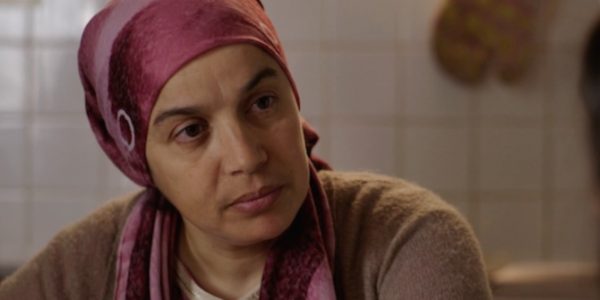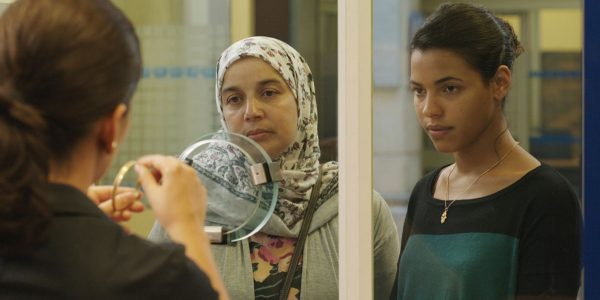FATIMA: Cultural Divides In Family & France

Racism in France has been a long-discussed topic within cinema, from Mathieu Kassovitz’s eponymous film La Haine to 2011’s hit comedy Les Intouchables. In recent days Muslim/Arab citizens have been the focus of racial prejudice from the French justice system; Fatima could not come at a better time with its refreshing take on Arab/French culture.
Philippe Faucon adds to this conversation with a portrayal of racial tension in France. Fatima recounts an Algerian mother’s (Soria Zeroual) plights to live in a country whose language she doesn’t speak, to connect with her daughters whom she can’t understand and work in a job where she encounters racial prejudice on a daily basis.
From the very first shot, the director addresses the recent calls to ban the wearing of the headscarf, or hijab, in French universities. The film opens with the protagonist wearing a headscarf in the foreground of the frame, clearly the primary focus, with her daughter without a headscarf in the background. Already the cultural difference is prevalent as Faucon establishes the focus of his film.
An Isolation in France
Similar to the style of Asghar Farhadi’s A Separation, Faucon adopts a subtle filmmaking style to ameliorate the protagonist’s emotions. Whenever Fatima is not with her daughters, not only does she rarely speak but she is primarily alone. Faucon emphasises on this by placing her in central frame and holding on her silence.

Rather than being gratuitous, this successfully conveys the extent of Fatima’s isolation from society within her work or social life. Her cultural divide prevents her from pronouncing her identity or opinion and thus, she is silenced by a barrier of language.
In this way, Faucon succeeds in illustrating a culturally divisive society in France. Even though she is a mother, she cannot talk about her children at school like the other parents can. She is just “a cleaner” whilst the other parents are well off, and therefore, she is in a different class, a class that her youngest is ashamed of. Her Arab origins puts her at a disadvantage, and this disadvantage is a challenge that her own children must face in their lives.
A Conflict at Home
Whilst the social commentary is prevalent throughout the film, the personal consequences of the cultural separation is just as potent when Faucon explores Fatima’s dynamic with her children. Whilst she works hard for her children’s education, to offer them a better life, the generational divide coupled with the cultural separates them from each other.
She cannot understand their motive, as they cannot understand hers. This is particularly evident in the multiple arguments she has with the younger, rebellious daughter, Souad (Kenza Noah Aiche). Often sounding confused, Fatima is rarely able to express herself and thus, frustration ensues.

Instead, Faucon introduces a more emotive element to the story by allowing Fatima to fully express her dreams, her wishes for her daughters and her concerns in a journal. Writing in Arabic she appears eloquent and thoughtful, unlike how she is portrayed in all her verbal encounters. With this, Faucon portrays the power of the written word to express the individual and, as a result, we understand the protagonist more intimately.
Resolution in Female Strength
Whilst each character goes through their personal struggle, social expectations are constantly in threat of invading. The eldest daughter, Nesrine (Zita Hanrot), appears to be the hope and pride of the family by studying hard for a degree in medicine. However, amongst her studies she has to deal with the social pressures that arise from her new situation.
Previously, simply known as the Arab daughter of a cleaner, she is criticised by neighbours for “looking down on” and “ignoring” them now that she is a medical student. With the acceptance into university, she is viewed as going up in class and is therefore criticised for “leaving her mother” to work hard on her own.
Faucon not only portrays the racist expectations of French society but the classist prejudice of the Arab inhabitants, too. People are put into boxes, boxes with clear limitations and if anyone tries to expand those boundaries and break from stereotype, they are criticised and even humiliated.

However, it is the encouragement of her mother, Fatima, which allows Nesrine to stay on target and then perform well in her exams. With the last scene being the most emotive and proving the successful result of not only Nesrine’s studies, but of Fatima’s struggles to do the best by her children.
Faucon continues to frame isolation until the very last shot, by showing Fatima returning to a scene of celebration on her own, in order to take another look at her daughter’s results. The theme of isolation has now become a private celebration of overcoming struggle and prejudice as Fatima smiles in pride.
Last Words
Faucon’s Fatima is a valuable contribution to the social commentary on not only racism in France, but sexism. Whilst acknowledging the problems that arise from language barriers, Faucon proves that true affection and dedication can transgress cultural divisions in order to make the true individual.
As the daughter of two Arab parents living in a non-Arab country, the difficulties and circumstances of cultural separation presented in this film proved all too familiar and I can safely say that the subject matter was portrayed accurately and with respect.
The simplicity of the filmmaking does the film a justice, there is no strong attempt at stylisation or artifice, instead Faucon lets the characters carry the story. Zeroual, being a cleaner herself, the accuracy and nuance of her performance is particularly commendable. One gets the sense that they are telling the truth, she is simply being herself and showing us what she has to deal with, as if it is a documentary, and in doing so, the emotional connection is all the more potent.
Do we have enough films highlighting the isolation immigrants can feel? Do you think films can help increase the audience’s understanding of what it must feel like to come to a new country?
Fatima opened in New York on August 26 and will open in Los Angeles on September 16. Find international release dates here.
Does content like this matter to you?
Become a Member and support film journalism. Unlock access to all of Film Inquiry`s great articles. Join a community of like-minded readers who are passionate about cinema - get access to our private members Network, give back to independent filmmakers, and more.













